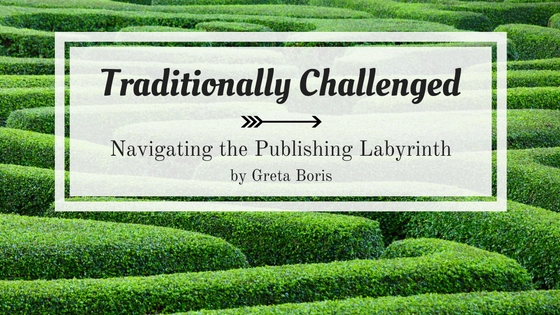by Greta Boris
Ask any author, no matter how successful, their least favorite part of the job. It will invariably have something to do with the query process.
Either they hate writing synopses, are never happy with their log line, can’t find the time to research agents or small presses, or the letter itself seems impossible. What often underlies the procrastination, frustration, and obfuscation is fear.
Many psychological types believe fear of rejection is an innate, subconscious part of our drive to survive. Something in our DNA tells us the pack is essential for life, that ostracism could be deadly. Even the introverts among us are pack animals at heart.
When a writer begins the query process they WILL BE rejected—not maybe, possibly, or sometimes. It’s a universal experience. There’s a remote possibility one lucky writer in a million will snag a contract on the first go round, but I’ve never met one.
Unless your father owns a publishing company or your mother is a celebrity, it’s a safe bet when you begin to shop your manuscript around, you’re going to hear the big N-O more than once. How do you make yourself step forward into what can feel like the maw of death?
To take the terror out of the query process, you have to change your mindset.
A few years ago a virtual buddy of mine, Bruce Sallan, popular radio show host and author of The Empty Nest Road Trip Blues wrote a guest post for my blog on the topic of online dating. In it he proposed 7 tips for navigating that maze. Finding the right publisher for your work is an awful lot like finding a mate.
- It’s scary
- You have to be realistic
- You have to be persistent
- You have to be picky
- You only need one
With a little tweaking, Bruce’s point of view works great for the query process.
1 Publishers and Writers are Different (Just like men and women)
Obvious? You’d think so, but in truth many writers don’t understand that. Writers are artists. They want their words to sing, their stories to soar, to produce something that’s never be done before. Publishers want to sell books. If yours is too unique, they probably won’t be willing to take a risk on you.
2 Publishers are Shallow (Just like men – kidding)
I say that with the utmost respect. (I’m very excited about my new publisher. More gushing to follow.) But, really, they’re attracted to writers that look good. Writers, it’s our job to tempt them. You should have a website, social media pages, be part of a writing community, have short work published in legitimate publications. If you want to be treated like a professional, act like one.
3 Have Reasonable Expectations (There’s a reason they’re called “gold diggers”)
If you’re the new kid on the block, show some humility. That’s not to say you shouldn’t have a list of deal breakers, but be realistic. Too many writers never get published because they’re not willing to settle for less than Harlan Coben’s agent and a $10,000 advance from one of the Big 5. Many top selling authors publish with small presses at some point in their career. Some have left big publishing houses for smaller, more supportive communities. All that glitters isn’t gold.
4 Don’t Sell Yourself Short (Marry in haste, repent at leisure as my grandmother used to say.)
Be humble, but not too humble. Remember you’re looking for a publishing situation that is a fit for you, your goals, personality, product, etc… About a year and a half ago, I turned down a contract. I know, I know. After pitching your work for months and hearing nothing but crickets it’s tempting to take whatever is offered. But that press and I would not have had a happy marriage. It’s much better to work hard to improve yourself so you can attract what you want than it is to cave in and accept second best.
5 The Publisher should Pick up the Tab (Chivalry isn’t dead.)
In this world of hybrid publishing, it can be very confusing to know what category that deal you’re entering into falls. There are essentially three broad models: independent publishing (with or without the help of a publishing service), traditional publishing, and vanity presses. I believe, and some may disagree, that the first two are valid. Run from the third.
- Publishing services are upfront about their costs and often have a menu. But you and they are clear, you are the actual publisher of the book.
- Traditional presses may or may not offer you an advance, but they won’t charge you for production, marketing, or any other service. They make money when your book makes money.
- Vanity presses have hidden costs but try to pass themselves off as legitimate publishers. If you read the fine print, you’ll find they make their money off you not from book sales.
6 Finding Your Dream Publisher Should be Your Priority (Bruce Sallan went on 467 dates before he met his wife!)
It’s a process. It takes persistence. If every rejection throws you into despair, you’ll never get there. Too many writers give up on the query process and either self-publish (not as an author-entrepreneur which is a serious and professional undertaking, but alone, without resources, and desperate) or walk away. I tried to learn from every rejection. I even got to the point where I graded them. Bad rejections were form letters and silences. Good rejections told me what was wrong with the work so I could improve.
7 Pay Attention to the Chemistry (A good fit will cover a multitude of sins.)
Over the past few years, I’ve pitched around seventy-five agents and editors. It sounds like a lot, but it’s not that many in the grand scheme of things. Sometimes it was painful, but it refined me. I learned a lot about the industry. I met successful agents I could never have worked with. I investigated reputable publishing houses where I’d have been miserable. The query process helped me fine tune my wish list:
- A small press where I’d be part of team
- A traditional approach to book selling with a savvy sense of online book markets
- Pretty book covers
- An author community I’d be proud to be part of
- A company that works on selling subsidiary rights
- A publisher who takes the long view
I’m so happy to announce, I tied the knot this week. I’ve signed on with Fawkes Press, a new company with a big vision. They are everything I’ve been looking for in a publisher. I think it’s going to be a happy marriage.
What are you looking for in your publishing mate?
***

Greta Boris Director
Greta Boris is the author of the Amazon Kindle bestsellerThe Wine and Chocolate Workout, a freelance writer, and aspiring novelist. She’s published articles on culture, health and entertainment for a variety of national magazines including Victorian Homes, Zombies, 50 Scariest Movies, Exodus, and Women of the Bible.
She’s currently at work on a domestic suspense series inspired by the seven deadly sins. She describes her work, and her life as a real housewife meets Dante’s Inferno.
*O.C. Writers is a member of Amazon Associates. By clicking the book links on this website, the network will earn a small commission from your purchase.



Great article, Greta. 457 dates, countless queries… goes to show that dating and publishing are all about the numbers. You’ve got to be in it to win it, so to speak.